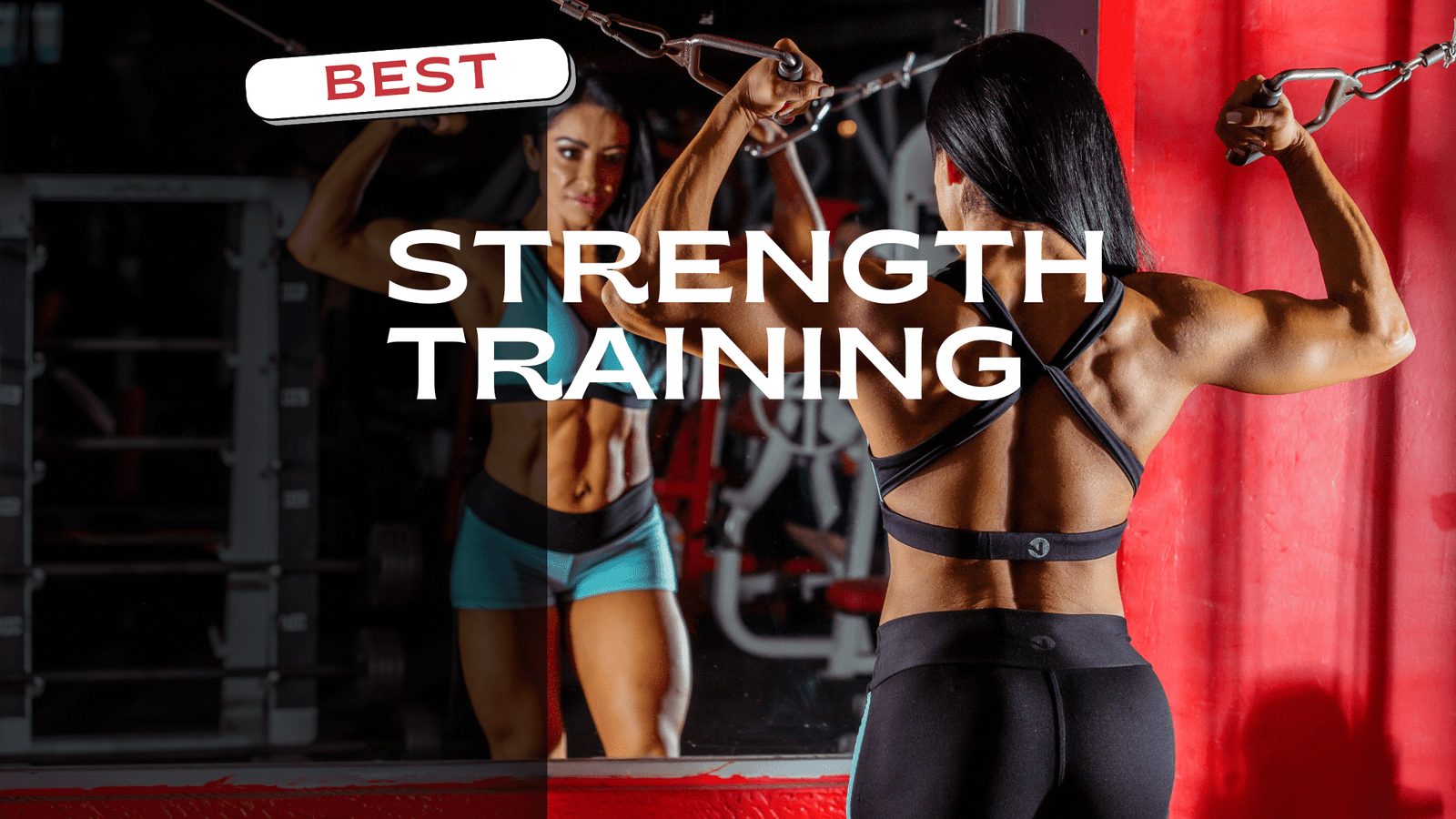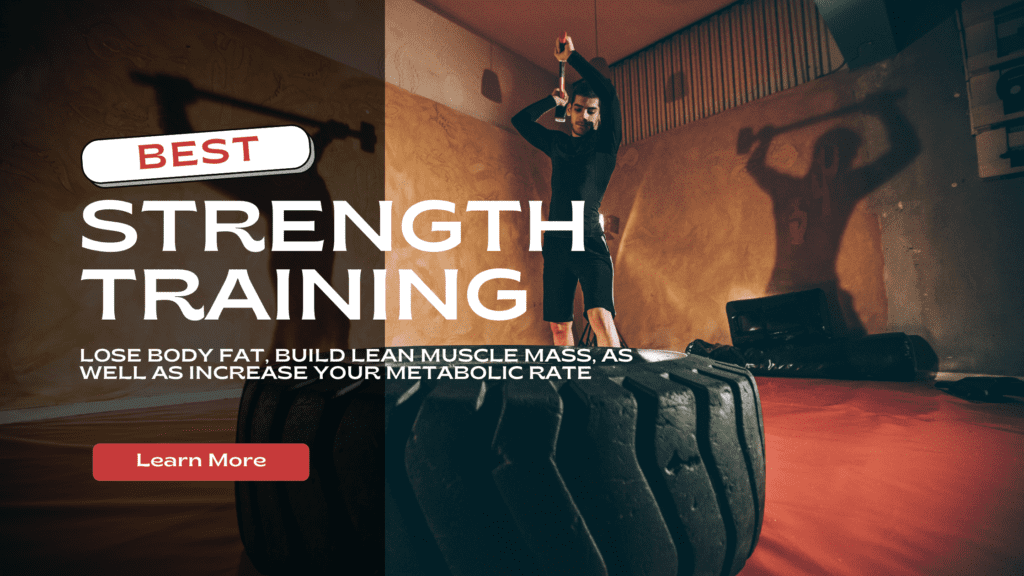Strength Training
Strength training.Would like to lose body fat, build lean muscle mass, as well as increase your metabolic rate? To the rescue, strength training! Strength training is critical for everyone’s overall health and fitness.
Strength training Use it or lose it
With age, lean muscle mass naturally declines.
If you do nothing to replenish the lean muscle you lose over time, your body fat percentage will climb.
At any age, strength exercise can help you maintain and develop your muscular mass.

Strength training may also benefit you in the following ways:
Strengthen your bones.
Strength exercise, by putting your bones under stress, can help you build bone density and minimise your risk of osteoporosis.
Maintain a healthy weight.
Strength workout can assist you in managing or losing weight, as well as increasing your metabolism and assisting you in burning more calories.
Improve your overall quality of life.
Strength workouts may improve your overall quality of life and ability to do daily activities.
Strength workouts can also help prevent joint damage. Muscle development can also help with balance and may help minimise your chance of falling. This can assist you in retaining your freedom as you age.
Take control of chronic conditions.
Strength training has been shown to improve the signs and symptoms of a variety of chronic illnesses, including arthritis, back pain, obesity, cardiovascular disease, depression, and diabetes.
Develop your critical thinking abilities.
According to some study, regular strength training and cardiovascular exercise may assist older persons enhance their thinking and learning abilities.
Strength training Consider the options
Strength training exercises can be performed at home or in a facility. Typical selections include the following:

Body mass index.
Numerous exercises can be performed with little or no equipment. Pushups, pullups, planks, lunges, and squats are all good exercises to try.
Tubes of resistance.
Resistance tubing is a low-cost, lightweight tubing that resists stretching.
There are numerous varieties of resistance tubes available at practically any sports goods store or online.
Free weights
Classic strength training implements include barbells and dumbbells. If you do not have weights on hand, soup cans can be used. Additionally, you can use medicine balls or kettle bells.
Weight machines
The majority of fitness centres have a variety of resistance machines. You can also purchase home weight machines.
Cable suspension training.
Another possibility is to try cable suspension training. Cable suspension training involves suspending a portion of your body — typically your legs — while performing body weight exercises like pushups or planks.
Getting started
Consult your doctor before commencing a strength training or aerobic fitness programme if you have a chronic ailment or are over the age of 40 and have not been active recently.
Consider warming up with five or ten minutes of brisk walking or another aerobic activity prior to beginning strength training. Ones that are cold are more prone to injury than muscles that are warm.
Select a weight or resistance level that is heavy enough to cause muscle fatigue after approximately 12 to 15 repetitions.
When you are able to perform additional repetitions of an exercise with ease, gradually increase the weight or resistance.
According to research, a single set of 12 to 15 repetitions with the appropriate weight can effectively grow muscle in the majority of people and is as effective as three sets of the same exercise.
As long as you push the muscle to fatigue — meaning you are unable to lift another repetition — you are performing the essential effort to strengthen the muscle.
Additionally, fatiguing at a greater repetition count indicates that you are likely utilising a lighter weight, which makes it simpler to control and maintain proper form.
Allow one full day between training each individual muscle group to allow your muscles to heal.
Additionally, pay attention to your body. Stop performing a strength training exercise if it causes pain.
Consider a lighter weight or retrying in a few days.
To avoid injuries during strength training, it is critical to practise good technique. If you’re new to strength training, see a trainer or other fitness professional to ensure you’re using proper form and technique.
Bear in mind to inhale and exhale as you strength train.
When to expect results
Strength training does not require you to spend hours a day lifting weights. With just two or three 20- or 30-minute strength training sessions each week, you can show considerable increase in your strength.
The Department of Health and Human Services recommends the following exercise guidelines for the majority of healthy adults:
Aerobic activity.
Get at least 150 minutes of moderate-intensity aerobic activity or 75 minutes of vigorous-intensity aerobic activity every week, or a combination of the two. The guidelines recommend that you carry out this activity across a week. Increased activity will result in even greater health benefits. However, even minor quantities of physical activity are beneficial. Being active for little amounts of time throughout the day might have a cumulative effect on one’s health.
Strength training.
At least twice a week, perform strength training exercises for all major muscle groups. Aim to complete one set of each exercise, using a weight or resistance level that causes your muscles to weary after approximately 12 to 15 repetitions.
You may see an increase in strength over time if you include strength training routines into your workout programme. As your muscle mass improves, you should be able to lift heavier weights for longer periods of time. If you persevere, even if you are out of shape when you begin, you can continue to build strength.
Read More @ Healthy Lifestyle :Fitness

